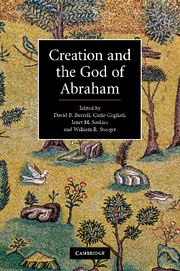Book contents
- Frontmatter
- Contents
- Contributors
- Preface
- Introduction
- 1 Creation ex nihilo: early history
- 2 Creatio ex nihilo: its Jewish and Christian foundations
- 3 The act of creation with its theological consequences
- 4 Scotistic metaphysics and creation ex nihilo
- 5 Creation and the context of theology and science in Maimonides and Crescas
- 6 Creation: Avicenna's metaphysical account
- 7 Four conceptions of creatio ex nihilo and the compatibility questions
- 8 Will, necessity and creation as monistic theophany in the Islamic philosophical tradition
- 9 Trinity, motion and creation ex nihilo
- 10 The Big Bang, quantum cosmology and creatio ex nihilo
- 11 What is written into creation?
- 12 Creatio ex nihilo and dual causality
- 13 God and creatures acting: the idea of double agency
- 14 Thomas Aquinas on knowing and coming to know: the beatific vision and learning from contingency
- Index
- References
8 - Will, necessity and creation as monistic theophany in the Islamic philosophical tradition
Published online by Cambridge University Press: 07 September 2010
- Frontmatter
- Contents
- Contributors
- Preface
- Introduction
- 1 Creation ex nihilo: early history
- 2 Creatio ex nihilo: its Jewish and Christian foundations
- 3 The act of creation with its theological consequences
- 4 Scotistic metaphysics and creation ex nihilo
- 5 Creation and the context of theology and science in Maimonides and Crescas
- 6 Creation: Avicenna's metaphysical account
- 7 Four conceptions of creatio ex nihilo and the compatibility questions
- 8 Will, necessity and creation as monistic theophany in the Islamic philosophical tradition
- 9 Trinity, motion and creation ex nihilo
- 10 The Big Bang, quantum cosmology and creatio ex nihilo
- 11 What is written into creation?
- 12 Creatio ex nihilo and dual causality
- 13 God and creatures acting: the idea of double agency
- 14 Thomas Aquinas on knowing and coming to know: the beatific vision and learning from contingency
- Index
- References
Summary
INTRODUCTION
Two interrelated questions present creation as a problem in the theistic traditions of Judaism, Christianity and Islam. The first is why a perfect God would create anything at all. The second is how He does it. While the first is a question of origination, the second is one of conservation. These questions become especially poignant when we consider another theistic tenet that creation adds to or extracts nothing from the infinite perfection of God. For medieval philosophers, these questions were not only theological but also strictly philosophical and methodical because, with Aristotle, they believed that to know something fully is to know its cause and origin. A proper understanding of the world is not possible without knowing who created it and why.
This is where the first paradox of creation arises: while we can know God through His creation, we are also urged to know the world through Him, i.e., as His creation. The world is something intelligible when seen as created, shaped and formed by the Supreme Artisan. Yet the arguments of contingency and creation-in-time are about the world, not God. This is natural theology at its best whereby we move from the radical contingency of the world to the supreme power of God. It was al-Kindi who first formulated an argument of creation in such clear and simple terms.
- Type
- Chapter
- Information
- Creation and the God of Abraham , pp. 107 - 132Publisher: Cambridge University PressPrint publication year: 2010

